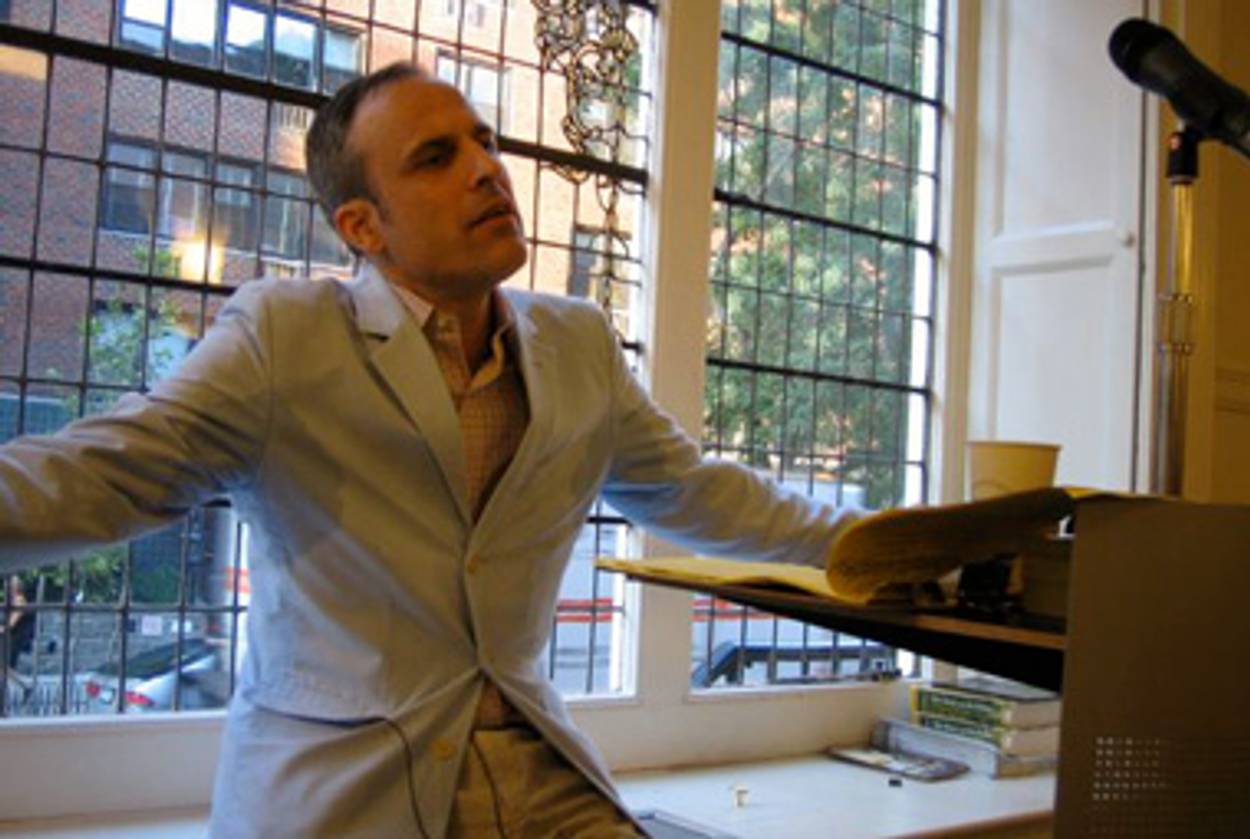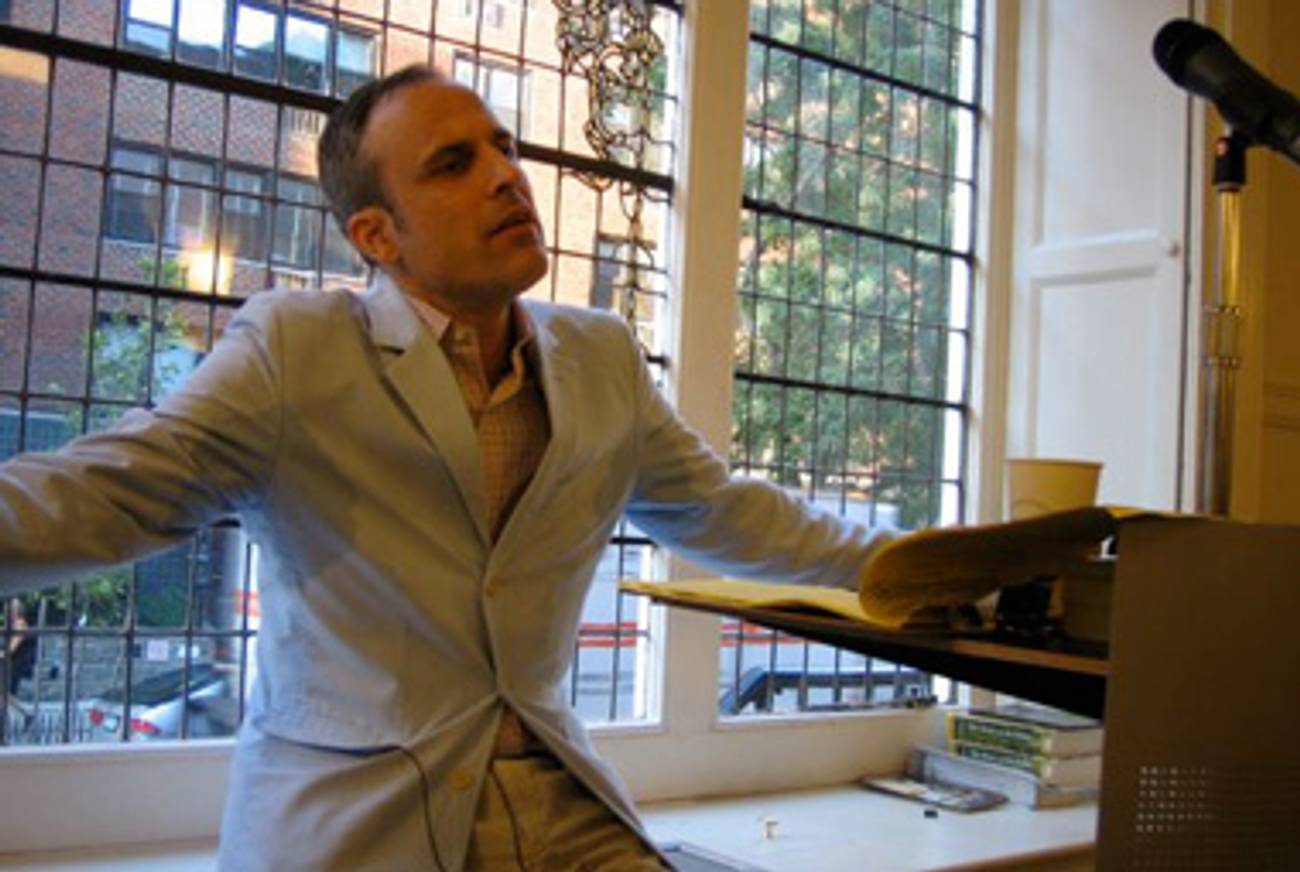Punk in the Beerlight
David Berman and his father’s sins




In the era of swift downloads, even “indie” musicians work tirelessly to be seen. They tour, collaborate, and reunite; they pitch songs for commercials and hit the festival circuit. But not David Berman. The former frontman for legendary, and genuinely indie, outfit Silver Jews is notoriously reclusive, so much that his reading last night at NYU was billed a “very rare appearance” and promptly sold out. A published poet and cartoonist, Berman was capping a summer writer’s conference run by Open City publishers. But those expecting only poetry were perplexed. Before us stood an afflicted son who outlined his quixotic effort to bring down his estranged, “somewhat satanic” father.
Bearded for years, Berman arrived at the reading clean-shaven, with a powder-blue suit jacket and cropped hair salted gray. (When he goes downtown, he no longer wears a corduroy suit.) He moved comfortably and deliberately at the podium, weaving his poems, uninterrupted by introductions, in with a deeply personal narrative. He spoke about quitting—”I always saw myself as a quitter”—various childhood pursuits, then music, then writing. Some in the audience surely considered other unsaid things Berman quit: A disabling drug addiction and depression. Seven years ago, he went clean after a suicide attempt and embraced Judaism anew. (You can hear him discuss his music and faith in this Vox Tablet podcast, in which he also straps on a guitar and sings Walt Whitman.)
In their first formal outing, 1994’s Starlite Walker, Silver Jews burst forth with a shambled, playful, lo-fi sound. (Stephen Malkmus, a charter member of Silver Jews, would go on to perfect this style with Pavement.) But the strength of the band’s later albums rested less on the music than on Berman’s lyrics. His words, sung in steady baritone, blend literary wit with melancholic Americana. And his poetry does the same.
Berman’s explanation of his departure from music led to his central subject. Contemporary musicians, he disparaged, were “expected to become entrepreneurs.” The increased commercialism he saw while performing brought him to a daunting conclusion: “My dad’s world has subsumed my world.” Berman’s disdain for his father, Rick, the chief lobbyist with Berman and Company, has been public for over a year. Writing to the Forward, Berman couched his opposition to his father in religious terms: “Jews should always identify with the disadvantaged. You cannot ‘graduate’ to a life of self-interest and exploitation.”
For a bulk of the discussion, Berman detailed what he deemed the pervasive impact of his father’s work. “I can’t fight my dad,” he intoned, “but I decided that I would be his nemesis.” And so he has embarked on that project, funding an expository documentary. The effort, he noted, is neither easy nor comfortable. But it is very necessary. “I’m in the process of changing,” he said, “from a reflective person to an active person.”
When the questions began, an audience member asked, sanguinely, why Berman didn’t consider revamping Silver Jews to bankroll this personal project. He brushed the possibility aside, citing the sorry state of today’s rockers (“pandering, pandering, pandering”). But the kernel of his decision is in the transition from reflection—in music, in writing—to action.
This change appears to coincide with a turn in his faith. Or perhaps it’s driven by it. “I’m a complete fraud,” he said, noting his appreciation for Torah study, “because I have no communal relationship with Judaism.” “Now,” he added, “I’m ready to be communal.” He gave a short nod, and left the podium.
Here are the Silver Jews at their final show, early last year:
Related: Silver Lining [Tablet Magazine]
Which Side Are We On? Jews Lead Fight For and Against Key Labor Bill [The Forward]
Silver Jews Singer Polishes Up Dirty Past [Jewish Journal of Los Angeles]
Earlier: Silver Jew Is Genius Cartoonist, Or Not
Mark Bergen is a journalist based in Bangalore. His Twitter feed is @mhbergen.